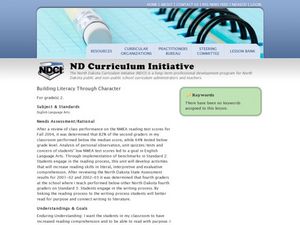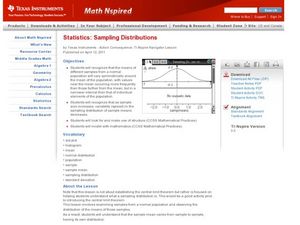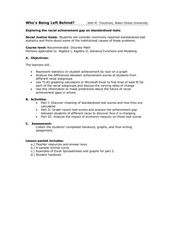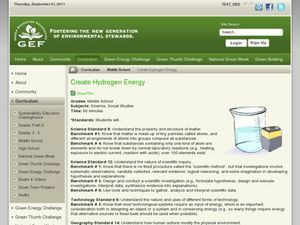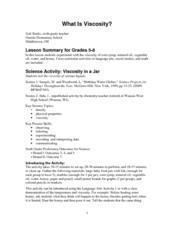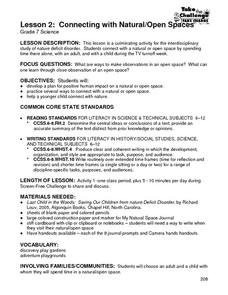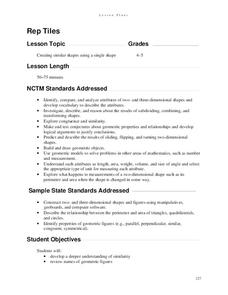Curated OER
John McCain's Tax Stand Misrepresented
Learners examine how political advertisements can be misleading. Using a political ad against tax reform, students generate questions based on the claims in the ads. They research information to support or refute the claims in the ad and...
Curated OER
Checking Test Comparability/Scattergrams
Students construct a scattergram graph. In this statistics lesson, students graph data by hand and using a spreadsheet program. They establish lines of best fit and draw conclusions using their graphs.
Curated OER
Building Literacy Through Character
Second graders connect reading to writing by making predictions, completing text to world connections, solving problems, and more. In this reading and writing lesson plan, 2nd graders draw conclusions after reading and write them down.
Curated OER
Assessing Normalcy
Students define normal distribution as it relates to the bell curve. In this statistics lesson, students use the central tendencies of mean, median and mode to solve problems. They plot their data and draw conclusion from the graphs.
Curated OER
Sampling Distributions
Young scholars analyze sampling from different population. In this statistics instructional activity, students define the meaning of sample sizes and what causes an increase or decrease. They graph their data on the Ti calculator and...
Curated OER
Who is Being Left Behind?
Students investigate scores as they relate to race. For this algebra lesson, students analyze standardized scores and how race can affect these scores. They plot their findings on a graph and draw conclusions.
Curated OER
It's My Right
Learners participate in activities examining the Bill of Rights. They discover the different articles and Amendments.
Curated OER
The Mathematics of Space and Place
Students investigate the measurements and geometry of the school grounds. They conduct inquiry while measuring the campus and some of the city blocks. Then students draw a map to scale and categorize property types using a pie graph.
Curated OER
Create Hydrogen Energy
Learners complete an experiment to understand changes to the environment over time. In this hydrogen lesson, students discuss electrolysis and conduct an electrolysis experiment. Learners observe and record their experiment.
Ohio Department of Education
Observe Then Infer
To develop their skill at drawing inferences from observations, sixth graders rotate through six stations, conduct a series of experiments, make observations, and draw inference from what they observe.
Curated OER
Opening Day Lesson: Getting to know each other
If you want an ice-breaker type activity, you should look at this resource. It introduces the idea and purpose of a press conference and then uses that concept for pupils to learn about one another. The teacher models the activity by...
American Statistical Association
Step into Statastics
Class members study the size of classmates' feet and perform a statistical analysis of their data. They solve for central tendencies, quartiles, and spread for the entire group as well as subgroups. They then write a conclusion based on...
American Statistical Association
Colors Challenge!
Does writing the name of a color in a different colored ink affect one's ability to read it? Scholars design an experiment to answer this question. They collect the data, analyze the statistics, and draw a conclusion based on what they...
BioEd Online
Muscles and Bones in Space
Being an astronaut takes not only high mental acuity, but also a high level of physical fitness, especially for those who spend a long amount of time away from Earth, such as the astronauts serving on the International Space Station....
Curated OER
What Is Viscosity?
Students experiment with the visocosity of corn syrup, mineral oil, vegetable oil, water, and honey. They research viscosity before beginning. Pupils draw the conclusion that the marble sinks more slowly in the liquids with greater...
Curated OER
Microfishing
Learners use a simple method to collect living microorganisms from natural and/or artificial environments and develop skills in microscopy, observation, drawing, speculation, hypothesizing, oral presentation, and raising questions.
Curated OER
Not Just the Facts
Encourage your learners to explore the differences between hard news and news analysis. They outline a complex news analysis about the upcoming presidential election, then endeavor to write an analysis of the same topic, using local...
Population Connection
The Human-Made Landscape
Agriculture, deforestation, and urbanization. How have human's changed the planet and how might we mitigate the effects of human activity on the planet? To answer these questions class members research the changes in human land use from...
Take the challenge
Connecting with Natural/Open Spaces
Get your class outside, away from the television, and maybe even learning something about nature while they're at it. Individuals will chose an open, natural space to spend time in for several days. Each day they will complete a page in...
Improving Measurement and Geometry in Elementary Schools
Rep Tiles
In addition to the catchy title, this lesson plan provides upper graders an opportunity to more closely scrutinize the attributes of plane figures. In particular, they focus on the similarity of different shapes. Both whole-class and...
Curated OER
Friar Margil & The Spanish Missions
Learners explore the life of Friar Margil de Jesus as well as other Spanish friars. They research Friar Margil and write a paragraph explaining why Spanish friars came to Texas. In groups, students create a PowerPoint presentation...
Curated OER
How Does Your Garden Grow? Discovering How Weather Patterns Affect Natural Cycles
For the warm-up in this cool climate lesson, you will need to click on "Mapping" and then "US Mapping" once you arrive at NOAA's "US Climate at a Glance" page. Earth science explorers realize that 2012 was a warm winter for us. They read...
Code.org
Packets and Making a Reliable Internet
That's not what I said! My message did not arrive in the correct order! Introduce the concept of packets and the transmission control protocol used to send and receive information over the Internet. The class participates in an unplugged...
NOAA
Deep-Sea Ecosystems – A Tale of Deep Corals
Many have debated which came first, the chicken or the egg, but this lesson debates which came first, the hydrocarbons or the carbonate reef. After a discussion on deep-sea corals, scholars receive a set of questions to research and...




